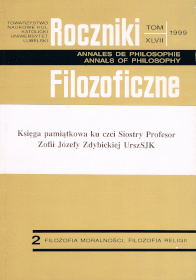Continuity and Development. 80 Years of Philosophy at the Catholic University of Lublin
Abstract
The paper presents an outline of the history of the philosophical faculty at the KUL both in the perspective of the function of philosophy as a discipline which has a formative character, and is studied by students of all faculties in order to build the foundations of the Christian attitude and for their formal education, and – first of all – as a research centre. Attention is especially paid to the dynamics of developing the methods of philosophising. It started with Louvain Thomism dominating in the period between the two world wars, passed through the influences of traditional Thomism, to showing more fully the specificity of existential Thomism. It is characteristic of the Lublin philosophical school (formed by S. Swieżawski, J. Kalinowski, M. A. Krąpiec, S. Kamiński, K. Wojtyła; and in the next generation – Z. J. Zdybicka, A. B. Stępień, T. Styczeń). It recurs to the ideals of the classical way of practising philosophy, first of all formulating a realistic conception of reality. However, it does so, leading a discussion with the whole of the philosophical heritage (especially critically using the achievements of phenomenology and analytical philosophy and treating the history of philosophy as sort of philosophical laboratory) and using the tools of modern methodology and logic. Moreover, it stresses the autonomy of philosophy and its independence of ideology and scientistically understood research. In the aspect of interest in particular branches of philosophy this meant a change from stressing the role of metaphysics to a broader development of anthropology and philosophy of the law, philosophy of God and religion, and finally – personalistic ethics. Next attention is drawn to the share of the Lublin circle in the international and Polish philosophical movement, especially with respect to organisation of congresses, conferences and symposia, membership of particular scholars in philosophical associations, and their participation in the editorial staffs of periodicals. Finally some philosophical publications, typical of the Lublin circle, especially in congress languages are mentioned.
Copyright (c) 1999 Roczniki Filozoficzne

This work is licensed under a Creative Commons Attribution-NonCommercial-NoDerivatives 4.0 International License.





